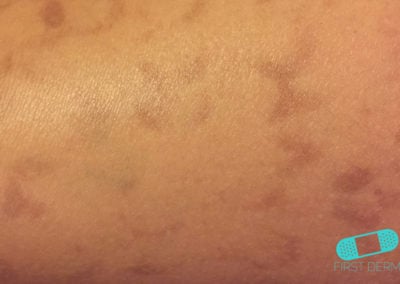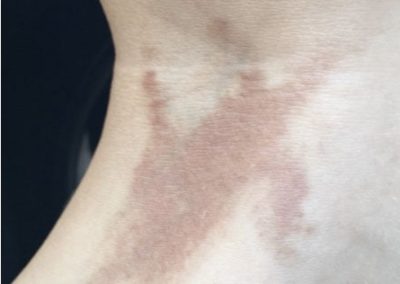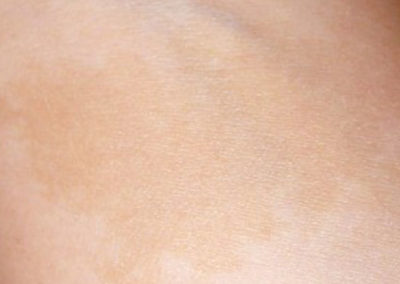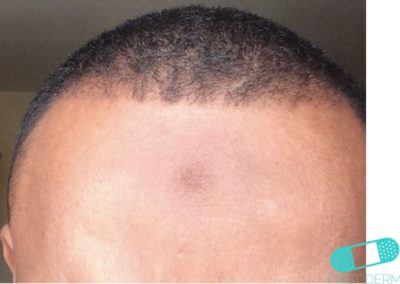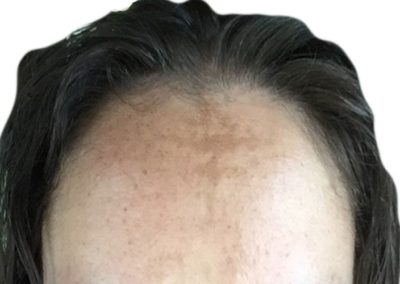Hyperpigmentation
Medically reviewed by The Dermatologists and written by Dr. Alexander Börve
- Often self-diagnosable
- Symptoms: Darkening of the skin
- Color: Typically brown or dark brown
- Location: Anywhere on the skin
- Treatment: No known cure; no treatment necessary; hydroquinone can bleach the skin
ICD-10: L81.4
ICD-9: 709.09
Related Blog Posts:
Sunscreen decoded: Is higher SPF better?
Sunburns: It’s time to get real
Hyperpigmentation is darkened areas of the skin due to sun damage or inflammation. This is caused by excessive production of melanin (the pigment that produces darker color in the skin).
One reason for hyperpigmentation is sun exposure. UV rays stimulate melanocytes that produce melanin to protect the skin from damage. In addition, melanocyte regulation becomes weak with age–this is why elder individuals have sun spots and other skin pigmentations. Other factors, such as chemotherapy drugs, pregnancy and endocrine diseases can increase the production of melanin as well. Other skin conditions can cause hyperpigmentation, too. This includes:
- Contact Dermatitis
- Atopic Dermatitis
- Ulcers
- Ringworm (Tinea Corporis)
- Eczema
- Tinea Versicolor
- Cushing Syndrome
- Jock Itch
- Acanthosis Nigricans
- Melasma
- Ichthyosis Vulgaris
- Acne
- Lichen planus
Try our FREE dermatology search engine and get peace of mind within a second
Symptoms
As the name suggests, hyperpigmentation causes the skin to darken. This condition can occur in small patches or over large areas of the body, sometimes even the entire body. Freckles, sun spots, and melasma are all examples of hyperpigmentation.
Melasma commonly develops during pregnancy and are most common on the abdomen and face. Sunspots are caused by excessive sun exposure, and thus appear on areas frequently exposed to the sun, such as the hands and face.
Post-inflammatory hyperpigmentation (PIH) is usually caused by acne, physical trauma, botched skin treatment and other types of skin inflammation. This type of hyperpigmentation is mainly focal and caused by occur on the back of the neck or under armpits.
What can I do?
Avoid exposure to the sun, as it can worsen the affected areas, making the skin darker. Sometimes, the darkened areas fade on their own without treatment.
Should I seek medical care?
Hyperpigmentation is usually not harmful, but can be a symptom of another medical condition. If you are not sure what causes hyperpigmentation on your skin, you should seek help from a healthcare provider.
Treatment
Hyperpigmentation is common and harmless, and there is no real cure. The spots can sometimes be lightened by topical creams and can be prevented with sunscreen.
Hydroquinone can bleach the skin, and usually take a few months to reduce the areas of hyperpigmentation. If you use over-the-counter creams, follow instructions carefully, and don’t use one for more than 3 weeks at a time.
In more severe cases, prescription creams with tretinoin and a cortisone cream may be used. These may be somewhat irritating to sensitive skin and will take 3-6 months to produce improvement.
Source:
Robert A Schwartz, MD, MPH. Medscape. Available at: https://emedicine.medscape.com/article/1069191-overview#a3
U.S. National Library of Medicine. Skin – abnormally dark or light. Available at: https://www.nlm.nih.gov/medlineplus/ency/article/003242.htm
Peter C. Schalock, MD. Hyperpigmentation. Available at: https://www.merckmanuals.com/professional/dermatologic-disorders/pigmentation-disorders/hyperpigmentation
American Osteopathic College of Dermatology. Hyperpigmentation. Available at: https://www.aocd.org/?page=Hyperpigmentation
Ask a Dermatologist Now
Anonymous, fast and secure!

The Specialist doctor from the University Hospital in Gothenburg, alumnus UC Berkeley. My doctoral dissertation is about Digital Health and I have published 5 scientific articles in teledermatology and artificial intelligence and others.
